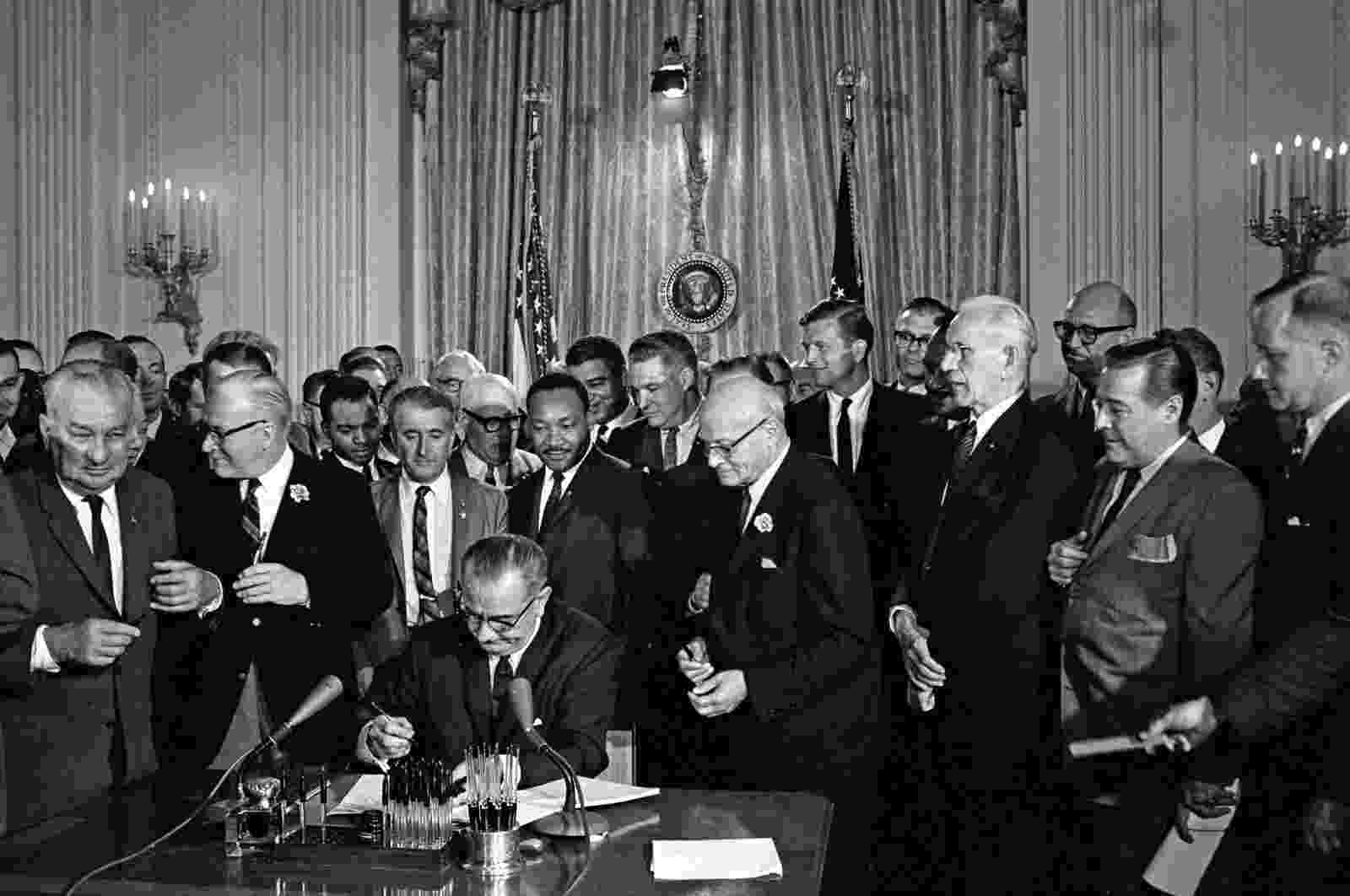The Civil Rights Act of 1964, first proposed by President John Kennedy, ended segregation in public places. It banned employment discrimination based on race, color, religion, sex, or national origin.
As a crowning achievement of the civil rights movement, the Act survived strong opposition from southern members of Congress and was signed into law by Kennedy’s successor, President Lyndon Johnson.
Become an insider. Subscribe to our newsletter for more top trending stories like this!
Following the Civil Rights Act, Congress enacted subsequent civil rights legislation, such as the Voting Rights Act of 1965 and the Fair Housing Act of 1968.
It’s been 59 years since the Civil Rights Act was passed. Below, we touch on meaningful insights from putting ourselves in Black Americans’ shoes.
What is the Civil Rights Act?
The passage of the Civil Rights Act of 1964 abolished segregation on the grounds of race, religion, and national origin. The Act’s proceedings abolished segregation from all places of public accommodation, including courthouses, parks, restaurants, theaters, sports arenas, and hotels.
It paved the way for Black people and other minorities to access services that they were denied simply based on the color of their skin. It called for equal protection.
People Also Read: African Women Leaders: 10 Inspiring Figures Shaping Africa’s Political Landscape
Historical Context of the Civil Rights Act
To understand the significance of the Civil Rights Laws, it’s vital to acknowledge the historical context that led to its enactment.
The 1964 Civil Rights Act was landmark legislation in the United States that addressed and rectified racial segregation and discrimination.
The Civil Rights Movement gained significant traction in the 1950s and 1960s. It was marked by widespread demonstrations, nonviolent resistance, and grassroots activism spearheaded by African American civil rights leaders. These leaders, including Martin Luther King Jr., Rosa Parks, and Malcolm X, had an impact on the Civil Rights Act, among others.
The movement shed light on systemic racism and inequality endured by African Americans as well as other marginalized groups. It sparked a national conversation about the urgent need for comprehensive civil rights legislation.
President John F. Kennedy’s assassination in November 1963 was a turning point in the civil rights struggle. His successor, President Johnson, made the Civil Rights Act a top priority in his first year, passing it in February 1964. Johnson had the massive backing of Clarence Mitchel and Roy Wilkins.
It addressed a wide range of issues, including voting rights, desegregation of public facilities, equal access to education through school desegregation, and fair employment practices.
The historical context surrounding the Civil Rights Act of 1964 reflects a period of significant social change and the culmination of years of activism. It highlights the resilience and determination of those who fought for equality and justice in the face of ingrained discrimination.
Legislative Breakthrough of the Civil Right Act
The Civil Rights Act of 1964 contained several key provisions that had a significant impact on the African American community;
The Civil Rights Act Prohibited Discrimination in Public Accommodations
Firstly, the Act prohibited discrimination in public accommodations, such as restaurants, hotels, and theaters, allowing African Americans equal access to these establishments.
Outlawed Discrimination in Employment
Secondly, it outlawed discrimination in employment. Resultantly making it illegal to discriminate against employees based of race, color, religion, sex, or national origin. This is in hiring, firing, or promotion. This provision opened up new opportunities for African Americans in the job market and helped to address racial inequalities in employment.
Provided Access to Previous Segregated Public Spaces
The impact of the Civil Rights Act of 1964 on the African American community was profound. By prohibiting discrimination in public accommodations, African Americans gained access to previously segregated spaces, fostering equality and breaking down segregation barriers.
Avenue for Economic Advancement for Black Americans
Additionally, the Act’s employment provisions opened up new economic opportunities for African Americans by eliminating racial discrimination in employment. This helped to reduce economic disparities between African Americans and white Americans and provided a foundation for greater socio-economic mobility. Interstate commerce thrived as well.
Overall, the Civil Rights Act of 1964 played a crucial role in advancing civil rights and equal opportunities for African Americans. This paved the way for further progress in the years to come.
Socioeconomic Progress
Since the Civil Rights Act of 1964, African Americans in the United States have made significant socioeconomic progress. The legislation, among others, opened doors to education, employment, and public accommodations for African Americans. The Act played a significant role to end slavery and the slaves even given an opportunity to vote.
As a result, the African American middle class expanded, with increased access to higher education leading to improved job opportunities and higher incomes. Black Americans’ access to political representation also improved, with African Americans holding prominent positions in government and making significant contributions to policy-making. The election of the first black president, Barack Obama, in 2008 is a testament.
Furthermore, the rise of prominent African American figures in various fields, such as business, entertainment, sports, and academia, has inspired and empowered future generations.
Ongoing Challenges
However, despite socioeconomic progress, senate and legislative breakthroughs, and access to opportunities, there is a need for equal protection of the laws. To date, black Americans still face significant challenges;
Systemic Racism
One significant challenge is systemic racism, which persists in institutions and societal structures. This leads to disparities in education, health, employment, criminal justice, and housing. Despite legal protections, discriminatory practices and biases continue to affect Black Americans, limiting their opportunities for advancement.
Educational Disparities
In the realm of education, Black students still face disparities in access to quality schools and resources. This contributes to lower graduation rates and limited higher education opportunities. The achievement gap between Black and white students persists, highlighting systemic barriers that hinder equal educational opportunities.
Assuring equal opportunities for all individuals, not on the basis of race or ethnicity, requires investment in public education, especially in public schools and job training programs.
Become an insider. Subscribe to our newsletter for more top trending stories like this!
People Also Read: 12 Amazing Black Inventors Who Didn’t Get Enough Credit
Employment Disparities
Additionally, Black Americans often experience higher unemployment, lower wages, and limited career advancement opportunities than their white counterparts. Discriminatory hiring practices, workplace biases, and a lack of diversity in leadership positions contribute to these challenges. Besides, some employees have received harsh treatments upon joining labor unions.
Criminal Justice Disparities
Furthermore, the criminal justice system disproportionately affects Black Americans, with higher rates of arrest, harsher sentences, and a greater likelihood of police violence victims. In regard of these ongoing challenges, it is essential to continue addressing systemic racism and creating an equitable society for Black Americans.
Wealth Gap
The wealth gap is a consequence of historical disadvantages, such as systemic racism, discriminatory practices in housing and lending, and limited access to capital and resources. African Americans also experience higher rates of poverty, limited access to quality healthcare, and disparities in educational attainment.
Cultural Impact of the Civil Right Act
As African Americans fought for their rights and equality through the civil rights movements and the National Association for the Advancement of Colored People(NAACP) in the early 1900s, their cultural expressions became powerful tools for resistance, empowerment, and cultural identity.
Influence on the Arts
In the arts, a wide variety of artists, including Jacob Lawrence, Romare Bearden, and Faith Ringgold, depicted the struggles and triumphs of the civil rights era in their vibrant and politically charged works.
These artists used various mediums, including painting, collage, and quilting, to depict African Americans’ experiences and challenge societal norms. Their art documented the movement and provided a visual narrative that ignited discussions about race, equality, and justice.
The Impact on Black Music
In music, the civil rights movement played a significant role in the development of genres like soul and jazz. Artists like Nina Simone, Sam Cooke, and Marvin Gaye used their music to address social issues like demanding justice, challenging racism, promoting unity and equality, and inspiring change.
Songs like “A Change Is Gonna Come” by Sam Cooke and “What’s Going On” by Marvin Gaye became anthems for the movement, resonating with African Americans’ struggles and aspirations during the fight for freedom.
The Leverage on Literature
Literature also flourished during the civil rights movement, with authors like James Baldwin, Maya Angelou, and Toni Morrison emerging as prominent voices. Their works explored racial identity, discrimination, and freedom.
Books such as Baldwin’s “The Fire Next Time,” Angelou’s “I Know Why the Caged Bird Sings,” and Morrison’s “Beloved” delved into the emotional and psychological impact of racism and became essential in shaping the narrative of African American experiences.
Impact on Entertainment
Popular culture also witnessed the influence of the civil rights movement. African American entertainers and sports icons gained increased visibility and recognition, challenging stereotypes and paving the way for broader diversity and inclusion in mainstream media.
Icons like Muhammad Ali, Sidney Poitier, and Diana Ross became symbols of black excellence and represented the resilience and determination of African Americans during the era.
The Future and Civil Rights Act
As we look toward the future, it’s clear that while significant progress has been made since the enactment of the Civil Rights Act, there’s still much work to be done to realize its goals fully.
The Act, signed into law in 1964, was a landmark piece of legislation aimed at dismantling systemic racial discrimination. It also promoted equal rights for all individuals. If need be, activists, legislative bodies, and even the supreme court should assist in continuous amendment of the laws.
While it played a crucial role in ending segregation and prohibiting discrimination based on race, color, religion, sex, or national origin, we continue to witness persistent disparities and injustices. These disparities underscore the unfinished business of the civil rights movement.
To fully realize the goals of the Civil Rights Act, we must address deeply rooted systemic inequities in society. Racial discrimination remains pervasive in various areas, including education, employment, housing, criminal justice, and voting rights.
We must focus on comprehensive reforms that promote equal access to quality education and job opportunities. Besides, we need to dismantle discriminatory practices in the criminal justice system, eradicate housing segregation, and ensure fair and affordable housing for all.
Above all, policies must protect voting rights to ensure every voice is heard in our democracy.
The fight for civil rights must also include intersectionality, which acknowledges that individuals face overlapping forms of discrimination based on race, gender, sexual orientation, disability, and more.
To create a society where everyone, regardless of their background, is treated with dignity and respect, we need inclusive policies that address the unique challenges faced by marginalized communities.
People Also Read: Black Culture: 5 African American Cultural Values With Rich History
” Spotcovery offers unique and fresh daily content on Black culture, lifestyle, and experiences. We talk about everything black, black people, black-owned and black-owned businesses. We also deliver authentic and relevant content that will inform, inspire and empower you! The future of black media is critical to today’s black experience! Our primary audience includes African American, African, Afro-Caribbean, and people of African heritage. Black culture is for the culture!”
Become an insider. Subscribe to our newsletter for more top trending stories like this!





